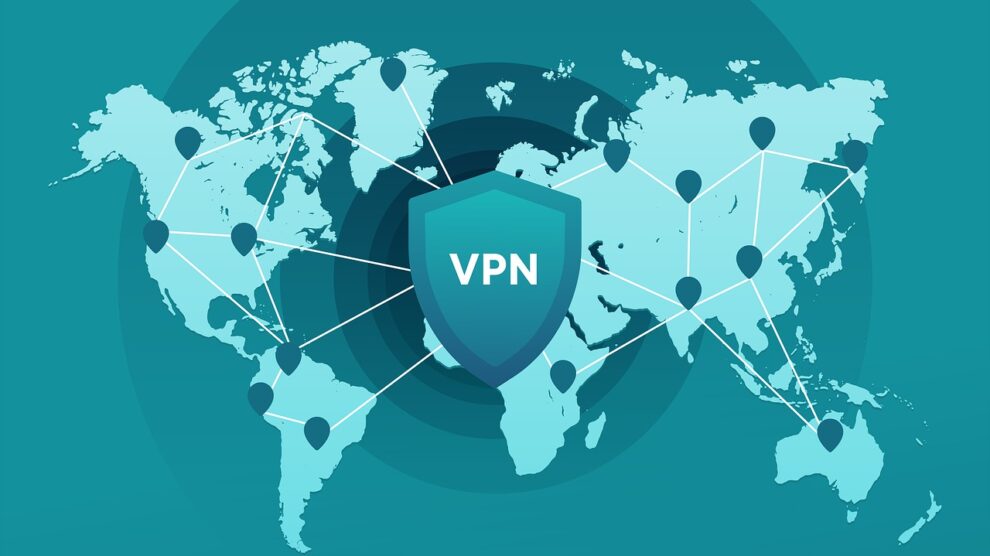Data breaches are happening more often, the amount of compromised data is rapidly increasing, and most companies are completely unprepared for breaches.
Moreover, in the wake of the pandemic, remote work has become the new normal for many businesses, and as a result, the need for online privacy and security skyrocketed.
The need for online privacy and security became even more critical, with approximately 58.6% of the U.S. workforce working remotely post-COVID.
In today’s business world, internet access is vital, but online privacy, including data protection, is equally important.
In this article, we’ll discuss how small businesses can avoid threats and why an excellent Virtual Private Network (VPN) is a crucial tool to safeguard against hackers and protect sensitive data, both online and on-site.
What is a Business VPN and How Does It Work?
A business VPN is a tool that allows remote employees and workers from different office locations to securely access their company’s internal network through an encrypted channel.
It’s like having your private road within a busy highway.
The VPN makes the information hard to read for anyone who tries to spy on it. This way, the business can keep its sensitive data safe from hackers and other online threats.
When an employee connects to it, all internet traffic from their device is encrypted and sent to the VPN server. The server then decrypts the traffic and sends it to its intended destination.
This process protects the data being transmitted from being intercepted and viewed by unauthorized users.
Business VPN provides a secure network infrastructure for remote employees to connect to their organization’s network, unlike personal VPNs, which primarily focus on providing online privacy.
Does Your Business Need a VPN?
Yes, your business needs a VPN. With the growing number of cyber attacks, safeguarding your data and online privacy has become more crucial.
Without a VPN, your business is vulnerable to data breaches, hacking attempts, and other cyber threats.
However, there are several compelling reasons why small businesses need to consider using a VPN including remote access, security and access management. Let’s take a closer look at some of the key reasons.
1. Remote Access
With remote access, employees can work from anywhere and anytime, but using unsecured networks can leave sensitive data vulnerable to cyber-attacks.
Implementing a VPN provides a secure tunnel between your device and the company’s network, and it allows employees to access company resources without compromising security.
When you connect to work files using personal or public WiFi, your sensitive data is at risk of interception by hackers and cybercriminals.
However, using a business VPN ensures secure remote access and protects against such threats.
This creates a secure passage between your device and your company’s network, allowing you to work remotely without anyone else being able to see what you’re doing.
2. Access Management
This involves controlling who gets access to what resources and data within your network, and a VPN provides an effective solution.
To accomplish this, a VPN goes through identification, authentication, and authorization. First, it verifies the identity of the person or application attempting to access the network.
Then, it proves the user’s identity, usually through a password or other means of authentication. Finally, it grants appropriate access levels and permissions associated with the user’s username or IP address.
For network security, the best practice is to restrict access only to authorized personnel. This helps prevent unauthorized access, data breaches, and other security risks.
Hence, with a VPN service from a reliable provider, network administrators can accomplish this by controlling access to sensitive data and applications.
3. Cybersecurity
One of the primary reasons why small businesses need a VPN is for cybersecurity. This tool is essential to protect sensitive data from unauthorized access and malicious attacks.
First, a VPN will encrypt all data transmissions between a remote worker and the company’s servers, ensuring that sensitive data is kept secure from third parties.
This can be especially important when employees use public WiFi networks, which are often unsecured and vulnerable to interception.
Additionally, a VPN can protect against DDoS attacks. These attacks can cripple a company’s online operations by overwhelming its servers with traffic.
Routing all traffic through a VPN can protect servers from these attacks and maintain their online presence.
By requiring authentication and authorization through the VPN, businesses can ensure that only authorized personnel can access sensitive data and applications.
What are the Benefits of Using a VPN for Your Small Business?
Using a VPN for your small business can provide numerous benefits beyond online security. Let’s take a closer look at some of the key advantages of implementing a VPN solution:
1. Enhanced Security
Small-to-medium-sized businesses are often targeted by cyberattacks, with a staggering 65% of attacks aimed at them. VPN access will help to protect your business from online threats, such as hacking and data breaches.
It encrypts your internet traffic, making it unreadable to hackers and unauthorized users.
You can securely access confidential information from anywhere with a VPN while reducing the risk of cyber attacks and security breaches.
2. Protecting Client Data
As a business that collects personal information from clients, customers, or patients, it’s important to take data protection seriously.
With a VPN, you can protect client data by creating an encrypted tunnel through which all network traffic is routed.
This encryption ensures that any data sent between the remote employee and the company’s network is secure and cannot be intercepted by third parties.
Additionally, a business VPN has security features that help to ensure that only authorized personnel have access to sensitive data and applications.
3. Improved Productivity
The use of a VPN not only provides security but also enhances employee productivity as they can securely access company data and applications from anywhere in the world.
Additionally, VPNs can eliminate the need for costly travel or in-person meetings, as employees can connect and collaborate virtually.
Its ability to provide easy and secure remote access makes it a valuable tool for businesses looking to increase productivity and stay competitive in today’s digital age.
4. Cost Savings
Adding a VPN to your security measures is a cost-effective solution. Despite the many benefits of VPNs, the cost is typically very reasonable.
It’s a smart investment that can instantly improve your company’s security. With a VPN, you can protect your business from potential data breaches and other cyber threats without breaking the bank.
Summary
In conclusion, small businesses are at risk of cyberattacks, and using a VPN can help protect sensitive data and prevent unauthorized access.
To protect sensitive data and enhance productivity, utilizing a VPN is an affordable and effective security measure.
Additionally, investing in a VPN service allows employees to work remotely and increase productivity without compromising sensitive information.





